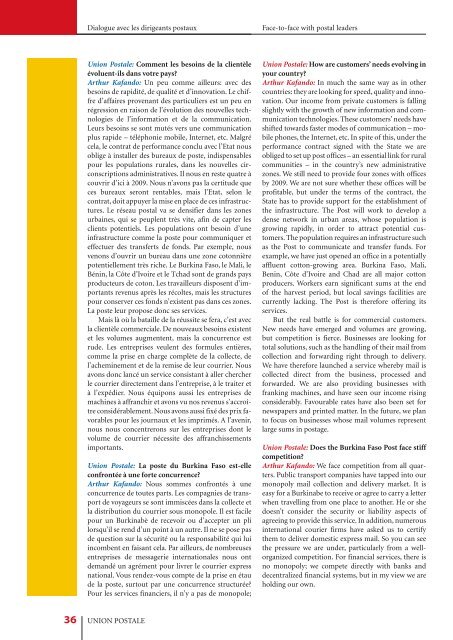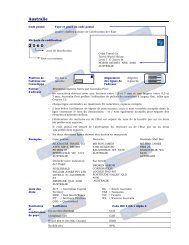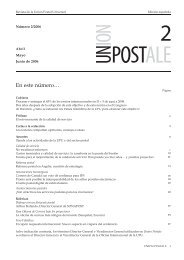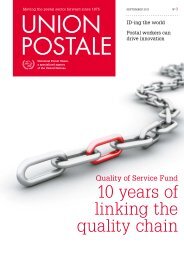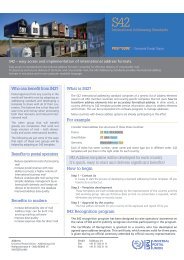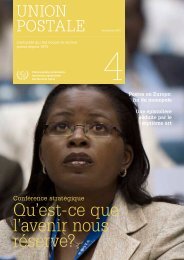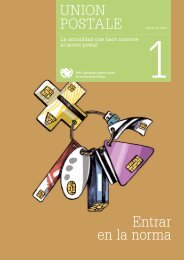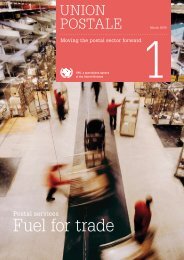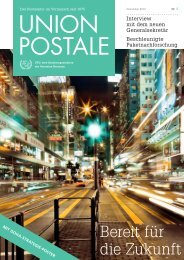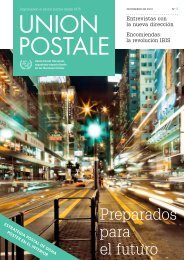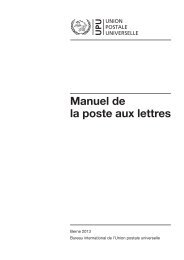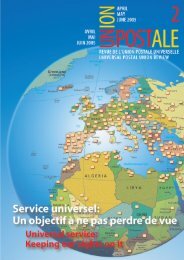Union Postale, revue de l'Union postale universelle - UPU ...
Union Postale, revue de l'Union postale universelle - UPU ...
Union Postale, revue de l'Union postale universelle - UPU ...
- No tags were found...
You also want an ePaper? Increase the reach of your titles
YUMPU automatically turns print PDFs into web optimized ePapers that Google loves.
Dialogue avec les dirigeants postauxFace-to-face with postal lea<strong>de</strong>rs<strong>Union</strong> <strong>Postale</strong>: Comment les besoins <strong>de</strong> la clientèleévoluent-ils dans votre pays?Arthur Kafando: Un peu comme ailleurs: avec <strong>de</strong>sbesoins <strong>de</strong> rapidité, <strong>de</strong> qualité et d’innovation. Le chiffred’affaires provenant <strong>de</strong>s particuliers est un peu enrégression en raison <strong>de</strong> l’évolution <strong>de</strong>s nouvelles technologies<strong>de</strong> l’information et <strong>de</strong> la communication.Leurs besoins se sont mutés vers une communicationplus rapi<strong>de</strong> – téléphonie mobile, Internet, etc. Malgrécela, le contrat <strong>de</strong> performance conclu avec l’Etat nousoblige à installer <strong>de</strong>s bureaux <strong>de</strong> poste, indispensablespour les populations rurales, dans les nouvelles circonscriptionsadministratives. Il nous en reste quatre àcouvrir d’ici à 2009. Nous n’avons pas la certitu<strong>de</strong> queces bureaux seront rentables, mais l’Etat, selon lecontrat, doit appuyer la mise en place <strong>de</strong> ces infrastructures.Le réseau postal va se <strong>de</strong>nsifier dans les zonesurbaines, qui se peuplent très vite, afin <strong>de</strong> capter lesclients potentiels. Les populations ont besoin d’uneinfrastructure comme la poste pour communiquer eteffectuer <strong>de</strong>s transferts <strong>de</strong> fonds. Par exemple, nousvenons d’ouvrir un bureau dans une zone cotonnièrepotentiellement très riche. Le Burkina Faso, le Mali, leBénin, la Côte d’Ivoire et le Tchad sont <strong>de</strong> grands paysproducteurs <strong>de</strong> coton. Les travailleurs disposent d’importantsrevenus après les récoltes, mais les structurespour conserver ces fonds n’existent pas dans ces zones.La poste leur propose donc ses services.Mais là où la bataille <strong>de</strong> la réussite se fera, c’est avecla clientèle commerciale. De nouveaux besoins existentet les volumes augmentent, mais la concurrence estru<strong>de</strong>. Les entreprises veulent <strong>de</strong>s formules entières,comme la prise en charge complète <strong>de</strong> la collecte, <strong>de</strong>l’acheminement et <strong>de</strong> la remise <strong>de</strong> leur courrier. Nousavons donc lancé un service consistant à aller chercherle courrier directement dans l’entreprise, à le traiter età l’expédier. Nous équipons aussi les entreprises <strong>de</strong>machines à affranchir et avons vu nos revenus s’accroîtreconsidérablement. Nous avons aussi fixé <strong>de</strong>s prix favorablespour les journaux et les imprimés. A l’avenir,nous nous concentrerons sur les entreprises dont levolume <strong>de</strong> courrier nécessite <strong>de</strong>s affranchissementsimportants.<strong>Union</strong> <strong>Postale</strong>: La poste du Burkina Faso est-elleconfrontée à une forte concurrence?Arthur Kafando: Nous sommes confrontés à uneconcurrence <strong>de</strong> toutes parts. Les compagnies <strong>de</strong> transport<strong>de</strong> voyageurs se sont immiscées dans la collecte etla distribution du courrier sous monopole. Il est facilepour un Burkinabè <strong>de</strong> recevoir ou d’accepter un plilorsqu’il se rend d’un point à un autre. Il ne se pose pas<strong>de</strong> question sur la sécurité ou la responsabilité qui luiincombent en faisant cela. Par ailleurs, <strong>de</strong> nombreusesentreprises <strong>de</strong> messagerie internationales nous ont<strong>de</strong>mandé un agrément pour livrer le courrier expressnational. Vous ren<strong>de</strong>z-vous compte <strong>de</strong> la prise en étau<strong>de</strong> la poste, surtout par une concurrence structurée?Pour les services financiers, il n’y a pas <strong>de</strong> monopole;<strong>Union</strong> <strong>Postale</strong>: How are customers’ needs evolving inyour country?Arthur Kafando: In much the same way as in othercountries: they are looking for speed, quality and innovation.Our income from private customers is fallingslightly with the growth of new information and communicationtechnologies. These customers’ needs haveshifted towards faster mo<strong>de</strong>s of communication – mobilephones, the Internet, etc. In spite of this, un<strong>de</strong>r theperformance contract signed with the State we areobliged to set up post offices – an essential link for ruralcommunities – in the country’s new administrativezones. We still need to provi<strong>de</strong> four zones with officesby 2009. We are not sure whether these offices will beprofitable, but un<strong>de</strong>r the terms of the contract, theState has to provi<strong>de</strong> support for the establishment ofthe infrastructure. The Post will work to <strong>de</strong>velop a<strong>de</strong>nse network in urban areas, whose population isgrowing rapidly, in or<strong>de</strong>r to attract potential customers.The population requires an infrastructure suchas the Post to communicate and transfer funds. Forexample, we have just opened an office in a potentiallyaffluent cotton-growing area. Burkina Faso, Mali,Benin, Côte d’Ivoire and Chad are all major cottonproducers. Workers earn significant sums at the endof the harvest period, but local savings facilities arecurrently lacking. The Post is therefore offering itsservices.But the real battle is for commercial customers.New needs have emerged and volumes are growing,but competition is fierce. Businesses are looking fortotal solutions, such as the handling of their mail fromcollection and forwarding right through to <strong>de</strong>livery.We have therefore launched a service whereby mail iscollected direct from the business, processed andforwar<strong>de</strong>d. We are also providing businesses withfranking machines, and have seen our income risingconsi<strong>de</strong>rably. Favourable rates have also been set fornewspapers and printed matter. In the future, we planto focus on businesses whose mail volumes representlarge sums in postage.<strong>Union</strong> <strong>Postale</strong>: Does the Burkina Faso Post face stiffcompetition?Arthur Kafando: We face competition from all quarters.Public transport companies have tapped into ourmonopoly mail collection and <strong>de</strong>livery market. It iseasy for a Burkinabe to receive or agree to carry a letterwhen travelling from one place to another. He or shedoesn’t consi<strong>de</strong>r the security or liability aspects ofagreeing to provi<strong>de</strong> this service. In addition, numerousinternational courier firms have asked us to certifythem to <strong>de</strong>liver domestic express mail. So you can seethe pressure we are un<strong>de</strong>r, particularly from a wellorganizedcompetition. For financial services, there isno monopoly; we compete directly with banks and<strong>de</strong>centralized financial systems, but in my view we areholding our own.36 UNION POSTALE


